Germany vs UK: Who's Winning the Tech Battle?
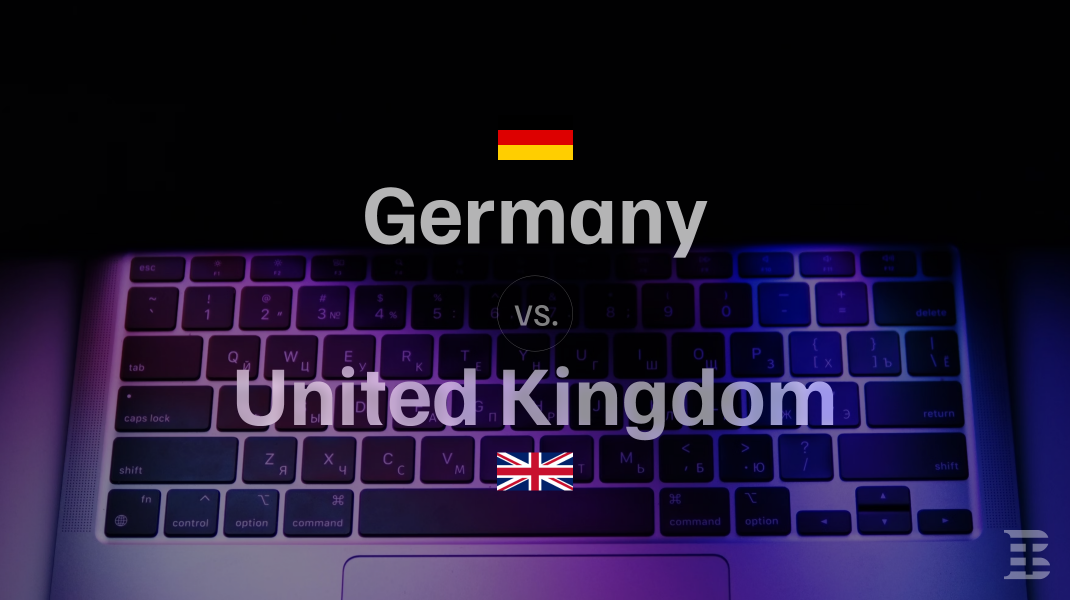
Summary
-
Germany and the UK are two of Europe’s strongest tech hubs, each with unique strengths and challenges.
-
Germany excels in engineering, manufacturing, and Industry 4.0, supported by skilled talent and government initiatives.
-
UK leads in fintech, AI, and cybersecurity, fueled by venture capital and a dynamic startup culture.
-
Germany faces bureaucracy, a risk-averse culture, and language barriers, while the UK faces high costs, political uncertainty, and a shortage of technological skills.
-
Both nations are shaping Europe's technological future—collaboration, not just competition, could lead to global leadership.
Germany or the UK, that is the question!
Both countries with strong technology ecosystems and rich technological innovation are vying for dominance on the European continent.
Germany - at the heart of Europe, with nine neighboring countries — more than any other in Europe- leads in high-tech industries like automotive and electronics, and excels with a highly skilled workforce and strong collaboration among industry, academia, and government.
The United Kingdom - an island country made up of 4 different countries: England, Wales, Scotland, and Northern Ireland, stands as a prominent tech economy, with a strong digital sector and a global reputation for leading research and startup initiatives.
So who is "winning" the technology battle? It's a complex question, and the answer depends on what criteria you use to measure success. In this article, we will analyze their strengths and weaknesses, key metrics, and perspectives to provide a nuanced picture of this technological rivalry.
Germany
Germany has one of the largest information and communication technology (ICT) markets and the largest software market in Europe.
In 2025, around 100,000 IT companies in Germany employ around 1,189 million people. Major players like Microsoft, Apple, Dell, Adobe, IBM, Oracle, and SAP dominate the market. The number of IT professionals in Germany has grown to around 1.3 million as of 2025
In addition, Germany's technology sector is renowned for its strong foundation in manufacturing and engineering. So what technological strengths does Germany have to be proud of? Let’s see.
Strong Points
-
Engineering Excellence and Strong Manufacturing
Germany built things well, excelling in precision engineering and technology-based manufacturing.
The country has made a significant impact in the automotive sector, where giants such as BMW and Daimler are at the forefront of technological innovation. In addition, companies such as SAP and Bosch are testaments to German engineering on the global stage.
Beyond these, Germany is also making its mark in industries such as industrial automation, software development, robotics, machine learning, and the Internet of Things (IoT).
It is the fifth largest robot market with approximately 26,000 robots used in various industries. The country is also a pioneer in Industry 4.0, through which it focuses on sustainability, smart technology, and automation, all aiming to come together to make production more efficient.
-
Government Strongly Supports
The German government supports its technology industry and provides significant financial and institutional support to research and development in the technology sector through various initiatives such as tax incentives for research and development, financial aid for startups, and a focus on digital infrastructure. These efforts contribute to Germany's robust technology ecosystem, positioning the country as a leader in the field.
It is important to mention the High-Tech Strategy for Germany, which is a strong case for government support of German technology, as well as the Federal Government's Report on the High-Tech Strategy 2025. If successfully implemented, it has the potential to transform the German economy and make the country a global leader in the high-tech sector.
-
Highly Skilled Technology Professionals
Germany has a lot of skilled workers who are good at engineering and technical stuff. They've got a great education system, considering that Germany is home to several world-renowned universities, such as the Technical University of Munich and the Karlsruhe Institute of Technology, that teach theoretical but also practical skills by learning by doing things hands-on. Because of this, tech professionals are highly skilled, and companies in the tech industry want to hire German workers.
The most in-demand tech jobs in Germany are in web and software development, IT security, data analysis, and fields like artificial intelligence (AI) and machine learning (ML).
Weak Points
-
Bureaucracy
In Germany, things can slow down a bit because of the bureaucratic system. It is usually necessary to submit signed documents and meet with government officials to address common issues.
-
Risk-averse Culture
Germans tend to be more careful with investments compared to people in some other countries. This cautious approach makes it tough for new businesses to get the funding they need to expand. They usually don't like taking risks, enjoy thinking things through carefully, and prefer having detailed plans.
-
Language Barrier
Since the German language is widely used, it could be a challenge for foreign companies trying to break into the German market. This is because negotiations and meetings can be difficult without knowledge of German, and important business documents, regulations, and contracts may only be available in German. German content is crucial for marketing materials, and hiring professional translators can be an additional expense.
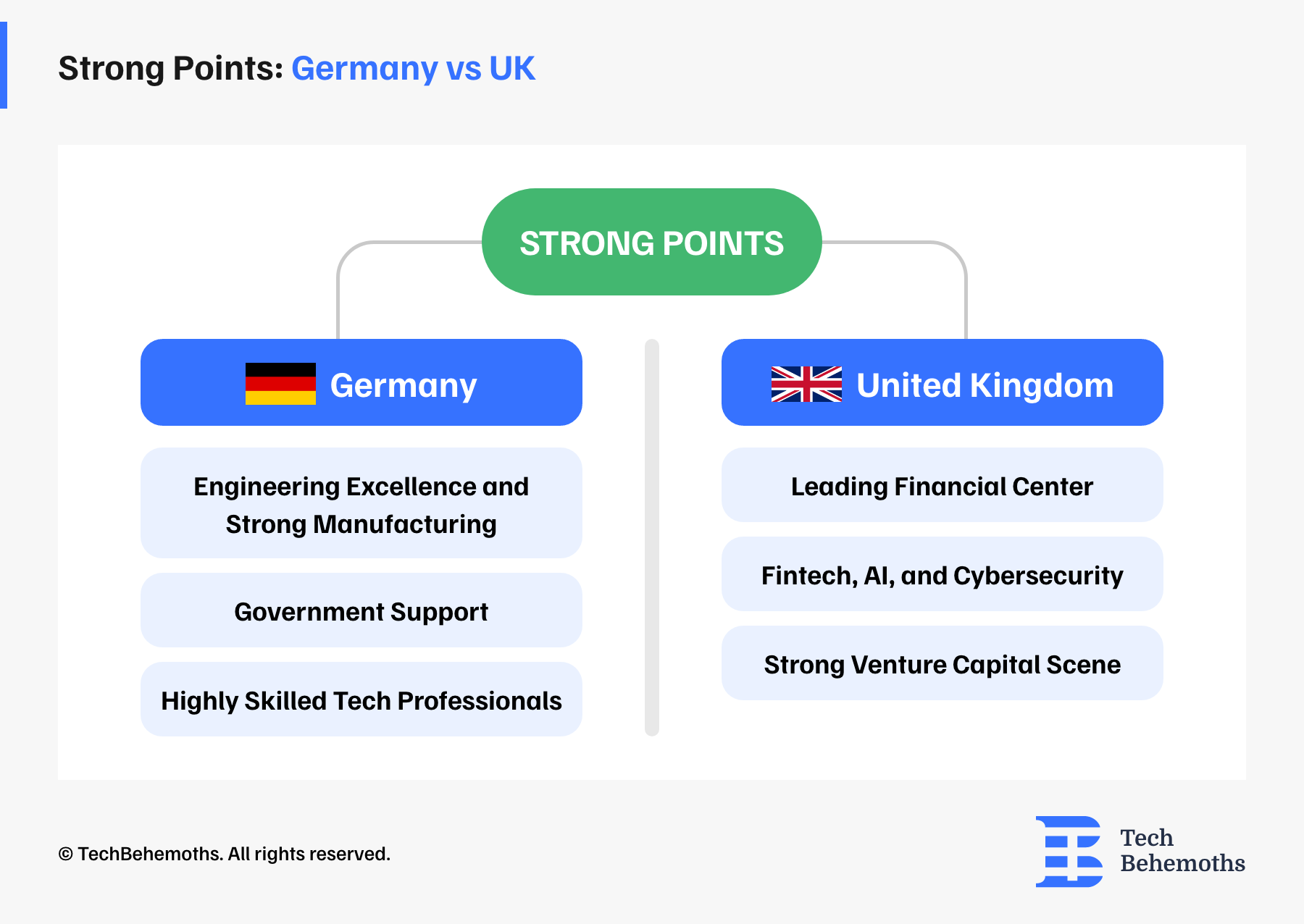
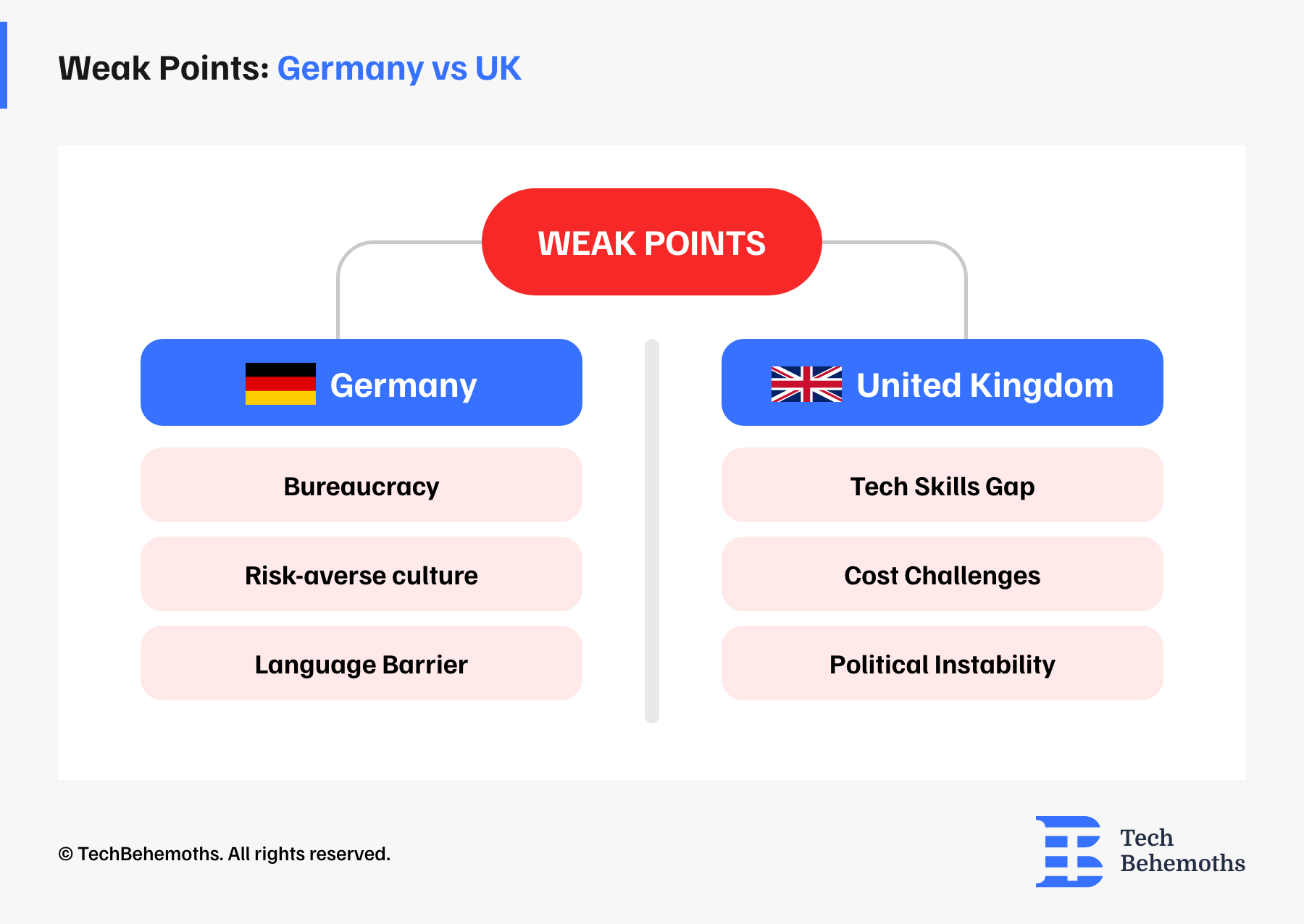
UK
The UK is a leading technology economy, known for its strong digital industry and global leadership in research and startups. The technology sector has become a major success for the UK, contributing over 25% more to its economy, adding over £150 billion.
The government plans to make the UK a leading force in science and technology by 2030. To this end, a House of Lords committee has launched A UK Tech Plan to build a better Britain through technology. What other strengths does the UK have in the field of technology? Let’s get to know.
Strong Points
-
Leading Financial Center
The UK is the European financial leader in the sale of financial services, earning over £110bn each year. London is the epicenter of the country's tech sector, with a vibrant business environment that includes lots of different services such as banking, insurance, and asset management, ready to engage in business with you
The UK has well-established rules and regulations for financial services that are well-known and respected, while it is known for its flexibility and responsiveness to market changes which helps new ideas come up and brings in more businesses.
The City of London, often called the Square Mile, is like the beating heart of the UK monetary world with big banks, insurance companies, and other money-related businesses.
-
Thriving Tech Ecosystem: Fintech, AI, and Cybersecurity
Since the early days of the empire, the British have embraced innovation and risk-taking, which has led to the creation of many successful technology companies in various sectors over time.
The thriving ones are:
Fintech is led by companies like Revolut, TransferWise, and Monzo which transform finance with creative mobile apps and online platforms.
Artificial Intelligence, here refers to AI research with universities like Oxford and Cambridge, and companies such as DeepMind and BenevolentAI that apply AI to solve complex problems in healthcare, finance, and other industries.
Cybersecurity, which is so important as we depend more on digital tech companies like Darktrace and Sophos leads the way, protecting businesses and individuals from cyber threats.
- Funding Access: Strong Venture Capital Scene
The UK is a magnet for entrepreneurs and investors. It has a diverse Venture Capital landscape offering startups funding options at various stages of growth. This includes angel investors, venture capital firms, and government-backed programs.
Venture capital investment has seen remarkable growth in recent years, reaching a record £12.3 billion in 2022. In 2024, VC investment in British startups and scaleups reached £9 billion, a 12.5% increase over 2023. However, venture capital investments for the full year 2024 did not exceed the level of the first quarter of 2022.
Good to know that behind the success of many companies in the UK are leading UK venture capital firms such as Balderton Capital, Index Ventures, Accel, lBGF Ventures, etc.
At the same time, the UK government supports venture capital through programs like the Enterprise Investment Scheme (SEIS) and the Enterprise Investment Scheme (EIS), offering tax relief to investors in early-stage companies.
Weak Points
Although the UK has a strong tech scene, there are also some weaknesses, and here are a few of them.
-
Tech Skills Gap
The UK faces a skills gap in tech fields like software engineering and data science. This is due to limited training programs and competition from larger companies. The new companies have difficulty finding and keeping skilled workers because larger companies can provide higher salaries and better benefits.
An additional factor is insufficient investment in research and development (R&D). The United Kingdom spends about 2.4% of its total money (GDP) on R&D, while the US spends 3.5%, and China spends 3.2%. This lack of spending is slowing down the UK in making advanced technologies and competing globally.
-
Cost Challenges
London is one of the most expensive cities in the world to live and do business. It comes with high costs and can be difficult, especially for startups. Expensive office space, higher salary expectations and high cost of living outpace other regions.
-
Political Instability
Britain's exit from the European Union has left businesses and investors uncertain about the future. This uncertainty regarding regulations, trade transactions, and access to European markets makes it difficult for companies to plan and commit to long-term investments.
To make things even clearer, let's put these 2 countries in a comparing and contrasting light.
Germany vs UK
Comparing
-
Living costs are generally higher in the UK than in Germany.
-
Corporate tax rates are similar, but personal income taxes are higher in the UK.
-
Visa - It's easier for EU citizens to work in Germany, while the UK has a more complex system for non-EU citizens.
-
In tech, Germany excels in automotive technology, and industry 4.0, and the UK leads in Fintech and AI.
-
Germany supports startups through government initiatives, while the UK's financial services industry attracts significant venture capital funding.
-
Both countries face challenges in attracting top tech talent, with Germany dealing with bureaucratic processes and the UK facing Brexit-related uncertainties.
-
Both nations have success stories like SAP and Deliveroo in Germany and Revolut and TransferWise in the UK.
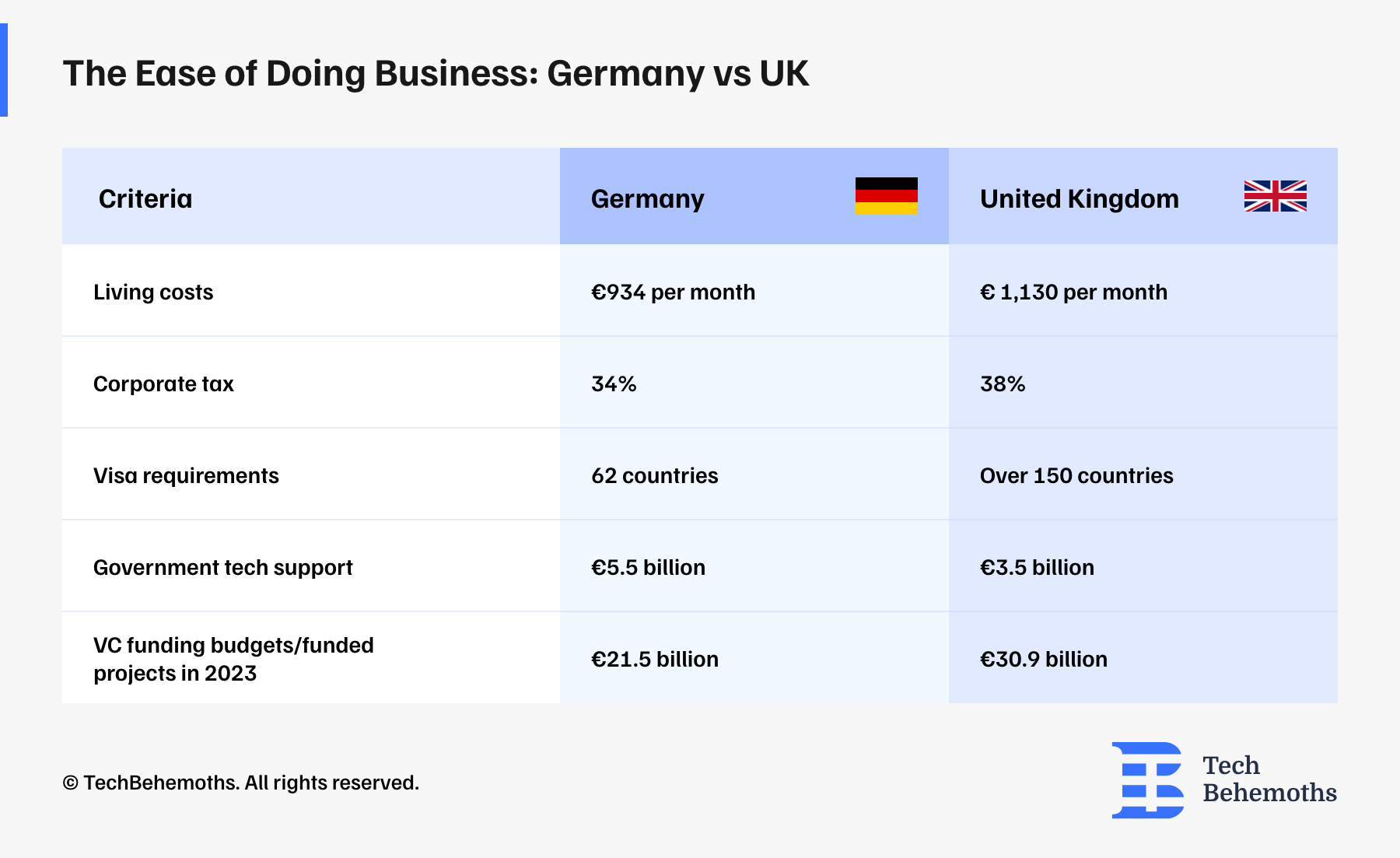
The cost of living in Germany is, on average, 21% lower than in the UK. This is mainly due to significant differences in rent, which is 17.4% more expensive in the UK.
The UK has the highest proportion of total tax revenue to GDP at 36%, while Germany's total tax revenue accounts for 34.7% of its GDP. For visits up to 90 days, citizens of 62 countries can enter Germany visa-free or with a Schengen short-stay visa. Longer stays require a purpose-specific national visa.As for the UK visa-free travel allows Commonwealth citizens and British (overseas) citizens to stay up to 6 months, EU, EEA, and Swiss citizens up to 3 months, and certain visa holders transit rights. However, citizens of more than 150 countries require a visa to enter.
Germany's 2023 federal budget allocated €5.5 billion for IT and digitalization, with extra funds at the regional levels. In the UK, the 2022 Digital Strategy committed £3 billion annually for digital transformation, including tech support infrastructure investments.
German VC investments totaled €21.5 billion, showing a slower growth trend. Key investors include Sequoia, HV Capital, and Earlybird VC. In the UK, VC investment reached £26.7 billion, surpassing pre-pandemic levels, with notable investors such as SoftBank Vision Fund, Balderton Capital, and Index Ventures.
Both countries differ significantly in cost of living, visa requirements, tax revenue proportions, and digitalization investments, reflecting their diverse economic landscapes.
In Contrast
The UK is generally considered easier to do business with compared to Germany due to:
-
Simpler regulations
-
A strong startup ecosystem
-
English language
Germany is considered more complex to do business with compared to the UK due to:
-
Stricter regulations
-
Higher competition
-
Language barrier
However, Germany offers some advantages like a larger market, a more skilled workforce, and higher government support.
Service Pricing Comparison
The hourly rates for different professional services vary between Germany and the United Kingdom. Each sector has pricing distinctions, from web development to managed IT services. Let's look closer at the hourly rates in Germany and the UK to understand the comparative costs in these key areas.
Germany charges approximately €38 per hour on average, while the UK's rate is around €25.
Germany's average hourly rate is €41.91, surpassing the UK's rate of €35.70.
Both Germany and the UK have similar pricing, with an average hourly rate of €15
Germany offers these services at an average hourly rate of €21, while the UK's rate is slightly higher at €23.
In the UK, the average hourly rate for ERP systems is €21, while in Germany, it is slightly higher at €22.
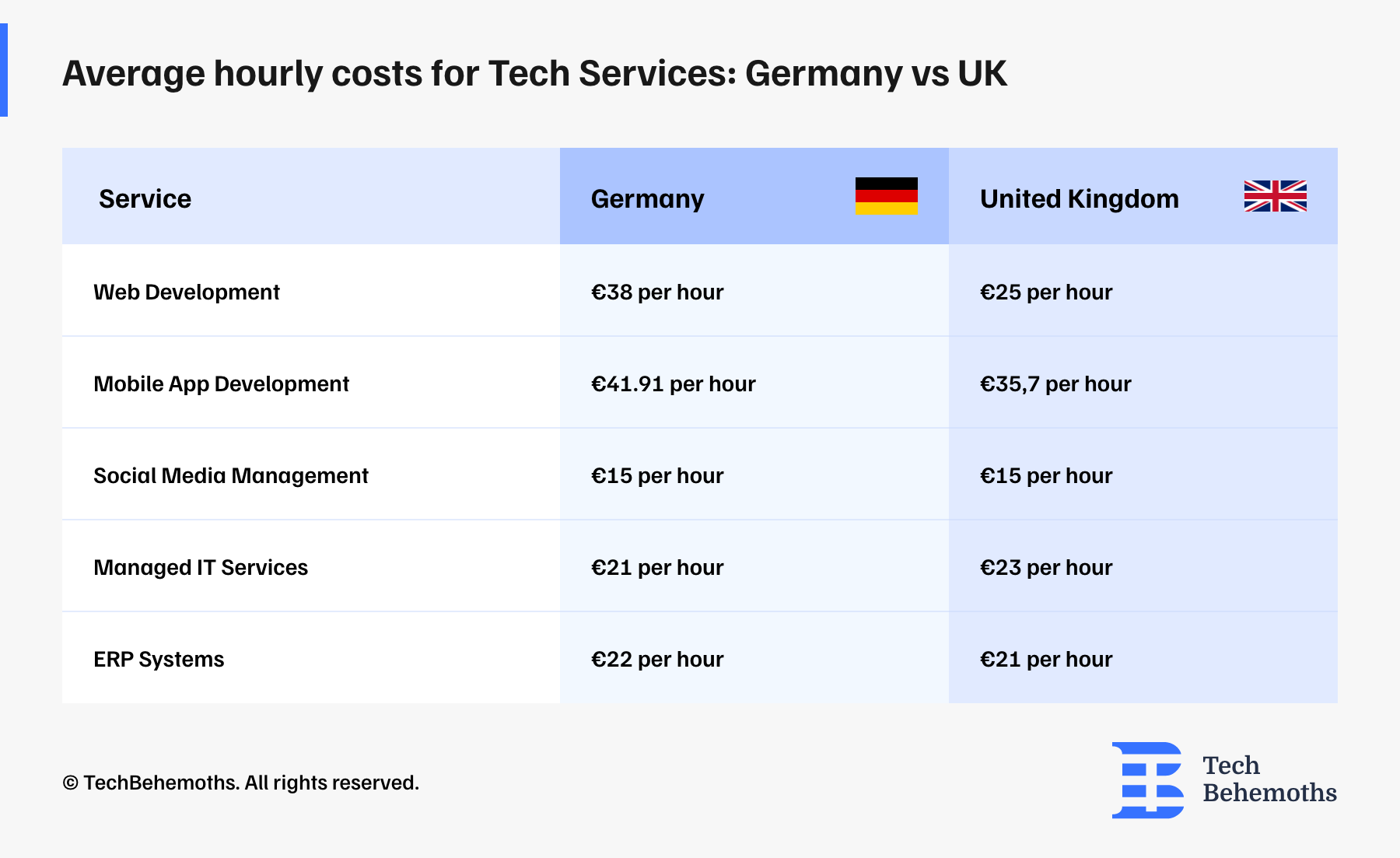
If you don't know where to find a suitable company for your project, in Germany or the UK, you can easily find the solution through the TechBehemoths Platform. Just use the filter and narrow the result for the perfect match.
Future Outlook
Competition between Germany and the UK is ruling the European tech scene. However, the long-term success would be in the case of mutual collaboration and knowledge sharing between these two countries.
By combining Germany's engineering power with the UK's creativity and access to capital, they can make European technology a global leader.
So, the narrative “Germany vs. the United Kingdom” is not just about a winner; it is a story of innovation, adaptation, and the potential for collaboration. The future of European technology likely depends on how Germany and the UK keep working together.
Wrapping Up
Strengths highlighted, weaknesses highlighted, and compare and contrast put in the ring from us! Now it's your turn. Who decided this battle for you?
Related Questions & Answers
Who is richer in 2025—Germany or the UK?
Who’s Happier: Germany or the UK?
Which is Safer: Germany or the UK?
Who is more future-ready in emerging technologies?